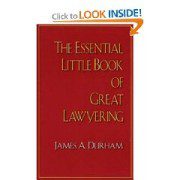The Essential Little Book of Great Lawyering
The Essential Little Book of Great Lawyering
by James A. Durham
The Essential Little Book of Great Lawyering is aptly named: at just 52 pages (including the title page, copyright, and table of contents), you’ll need less than an hour to discover the essential skills of great lawyering. Some readers may be wondering why anyone would need a book to learn what great lawyering is, and some may be thinking that great lawyering “obviously” means possessing enormous technical expertise, good judgment, and years of experience in which to develop those attributes. That is what most lawyers mean by great lawyering. But what do clients mean?
According to Durham’s client interviews, a great lawyer is one who knows the law and has “become a lawyer that people trust above all others, and . . . to whom they turn when they (or people they know) have any kind of problem. In other words, a great lawyer is one who knows and responds to her client’s needs, desires, and preferences. Durham’s research revealed that 90% of clients say that they like lawyers who are responsive and who really know their client’s business, but they seek even more. Great lawyers also communicate clearly, build relationships with their clients, provid remarkable value, and are loyal to their clients.
The Essential Little Book manages to go beyond those generic words to offer specific examples of what lawyers must do to succeed fully in practice. My only quibble with the book is Durham’s suggestion that a lawyer must know what his client wants to happen throughout the engagement. I would recommend that, to the extent it’s feasible to do so, a great lawyer would ask what his client wants, including how much communication is helpful and in what form, how advice might be presented most usefully, etc. Nevertheless, Durham’s point is well-taken: great lawyers pay attention to what their clients want and need, perhaps even more than the clients do.
One of the key mistakes I make is believing that “being a great lawyer” (as measured by technical expertise) is all that’s necessary to build a successful practice. Durham addresses this same problem and offers that being a great lawyer (as defined by clients) is the foundation of a successful practice. I couldn’t agree more.
The Essential Little Book should be required reading for lawyers. Between now and the end of the year, set aside an hour to read the book and another half-hour to set some goals to help you become a great (or even greater) lawyer. You’ll build a much stronger practice for that effort.




Leave a Reply
Want to join the discussion?Feel free to contribute!